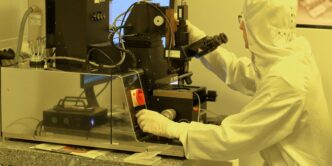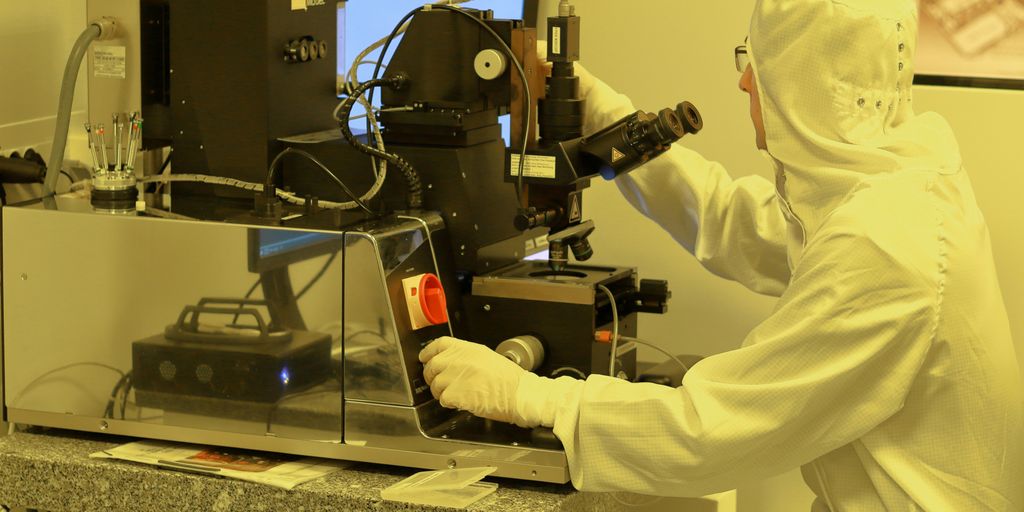I’ve been poking around asml careers lately, and wow, they really cover a ton of ground. From chip-making machines to software and field support, there’s a fit for almost any tech interest. In this piece, I’ll walk you through the job options, how to make your application stand out, what happens in interviews, and why ASML can be a place to grow.
Key Takeaways
- asml careers span roles in lithography, software engineering, field service, and research
- You’ll want to tailor your resume, showcase cross-team projects, build a technical portfolio, and polish your online profiles
- The interview includes a technical assessment call, a problem-solving exercise, teamwork questions, and a look at ASML’s values
- ASML’s culture is all about Challenge, Collaborate and Care, with global teams and strong inclusion efforts
- You can keep learning through ASML’s training tools, job rotations, certifications, plus enjoy health plans, flexible schedules, and reward programs
Unveiling ASML Careers Opportunities
Okay, so you’re thinking about a career at ASML? Awesome! Let’s break down the kinds of opportunities they usually have. It’s not just about one thing; they’ve got a bunch of different areas you could fit into. ASML is the world’s leading semiconductor lithography machine manufacturer. They make the machines that make microchips. Their technology enables chip manufacturers to make cheaper and faster microchips, thereby enabling all the technology you use today.
Emerging Roles in Semiconductor Lithography
This is where ASML really shines. Think about roles directly involved in designing, building, and maintaining those crazy complex lithography machines. We’re talking about optical engineers, precision mechanics, and control systems specialists. These roles are at the heart of what ASML does, pushing the boundaries of what’s possible in chip manufacturing. It’s a fast-paced environment where you’re constantly learning and working with cutting-edge tech. If you’re into physics, optics, or super-precise engineering, this could be your jam.
Software Engineering Positions at ASML
Don’t think it’s all hardware! Software is HUGE at ASML. They need people to write code for everything from machine control to data analysis and simulations. Think about developing algorithms to optimize machine performance, creating user interfaces for operators, or building software to analyze the massive amounts of data these machines generate. It’s a chance to work on really complex problems and see your code directly impact the manufacturing of the world’s most advanced microchips.
Field Service and Customer Support Functions
These are the folks who keep ASML’s machines running smoothly at customer sites around the globe. It’s a mix of technical skills and people skills. You’ll be troubleshooting problems, performing maintenance, and training customers on how to use the equipment. It can involve a lot of travel, but it’s a great way to see the world and work directly with customers. Plus, you get to be the hero who saves the day when a machine goes down. ASML hires the brightest minds in customer support.
Research and Development Projects
ASML is always looking ahead, trying to figure out what’s next in chip manufacturing. That means a ton of R&D. These projects can range from developing new light sources to exploring completely new lithography techniques. You’ll be working with some of the smartest people in the industry, pushing the limits of what’s possible. It’s a chance to be creative, innovative, and contribute to the future of technology. If you love solving tough problems and aren’t afraid to experiment, R&D could be a great fit.
Crafting a Standout Application for ASML Careers
So, you’re thinking about applying to ASML? Great choice! But getting your foot in the door requires more than just a generic resume. It’s about showing them you’re the right fit. Let’s break down how to make your application shine.
Customizing Your Resume for Technical Roles
Okay, first things first: ditch the generic resume. Your resume needs to speak directly to the technical requirements of the role. I mean, really tailor it. Scour the job description for keywords related to specific technologies, tools, and methodologies. Then, make sure those keywords appear naturally (but prominently!) in your resume. Don’t just list them; show how you’ve used them to achieve results. For example, instead of saying "Experienced with Python," say "Developed a Python-based data analysis tool that improved process efficiency by 15%." See the difference? Quantify your achievements whenever possible. It makes a huge impact.
Highlighting Cross-Disciplinary Projects
ASML is all about collaboration. They want to see that you can work with people from different backgrounds and areas of expertise. So, if you’ve worked on any projects that involved multiple disciplines (like software, hardware, and optics), make sure to highlight them. Explain your role in the project, the challenges you faced, and how you collaborated with others to overcome them. Did you bridge the gap between the software team and the hardware team? Did you translate technical jargon for non-technical stakeholders? These are the kinds of things that will make you stand out. Think about projects where you had to integrate different systems or solve problems that required knowledge from multiple fields. Those are gold.
Assembling a Technical Portfolio
Okay, a resume is good, but a portfolio is even better. A technical portfolio is basically a collection of your best work that demonstrates your skills and abilities. This could include code samples, design documents, presentations, or even personal projects. The key is to choose projects that are relevant to the roles you’re applying for. If you’re applying for a software engineering position, include code samples that showcase your proficiency in relevant programming languages and frameworks. If you’re applying for a hardware engineering position, include design documents or simulations that demonstrate your understanding of circuit design or signal processing. Make sure your portfolio is well-organized and easy to navigate. A messy portfolio is worse than no portfolio at all. Consider using platforms like GitHub or a personal website to showcase your work. If you’re looking for inspiration, check out Varun Shah’s pioneering journey to see how a leader in tech showcases their work.
Optimizing Online Profiles
Your online presence matters. Recruiters will Google you. So, make sure your LinkedIn profile is up-to-date and professional. Use a professional headshot, write a compelling summary that highlights your skills and experience, and list all your relevant skills and certifications. Also, consider creating a profile on other platforms like GitHub or Stack Overflow, especially if you’re applying for technical roles. These platforms allow you to showcase your contributions to open-source projects and demonstrate your engagement with the technical community. Make sure your profiles are consistent with your resume and portfolio. You want to present a cohesive and professional image across all platforms. Think of your online profiles as an extension of your resume. They’re an opportunity to tell your story and show recruiters what you’re all about. Also, make sure to search for ASML careers on LinkedIn to get a feel for the types of profiles they’re looking for.
Mastering the ASML Interview Experience
So, you’ve landed an interview with ASML? Congrats! Now comes the part where you show them what you’ve got. It’s not just about technical skills; it’s about showing you can think, collaborate, and fit into their unique culture. Let’s break down how to ace those interviews.
Navigating Technical Assessment Calls
Okay, the first hurdle is often a technical assessment call. Think of it as a quick check to see if you have the baseline knowledge for the role. Be prepared to discuss your experience with relevant technologies and methodologies. They might throw some coding questions your way, or ask you to explain a complex concept. Brush up on the fundamentals, and don’t be afraid to say, "I don’t know, but I’m eager to learn." It’s better to be honest than to try and fake it. You can also check ASML interview candidates to get an idea of the types of questions they ask.
Demonstrating Problem-Solving Skills
ASML loves problem-solvers. They want to see how you approach challenges, not just if you know the answer right away. Be ready to walk them through your thought process. Explain how you break down a problem, what assumptions you make, and how you test your solutions. They might give you a hypothetical scenario or ask about a time you faced a tough technical issue. Use the STAR method (Situation, Task, Action, Result) to structure your answers. It helps keep you focused and provides a clear narrative. For example, if they ask about a time you failed, don’t just say you failed. Explain what you learned and how you would approach it differently next time.
Showcasing Collaborative Mindset
ASML emphasizes teamwork. They want to know you can work well with others, even when things get tough. Share examples of times you collaborated on projects, how you handled disagreements, and how you contributed to a team’s success. Did you ever mentor someone? Did you help resolve a conflict? These are the kinds of stories that show you’re a team player. Remember, it’s not just about your individual accomplishments; it’s about how you contribute to the collective goal. Be prepared to discuss how you communicate with team members, especially in a global environment.
Aligning With ASML Values
ASML has a specific set of values they look for in candidates. Do your homework and understand what those values are. Think about how your own experiences and beliefs align with them. Are you passionate about innovation? Do you thrive in a challenging environment? Are you committed to continuous learning? Use the interview as an opportunity to show how you embody these values. Don’t just say you’re innovative; give examples of times you came up with creative solutions. Don’t just say you’re a hard worker; share stories of times you went above and beyond to achieve a goal. Show, don’t tell. Understanding the ASML values is key to a successful interview.
Embracing ASML Culture and Values
ASML isn’t just about making machines; it’s about the people who make it all happen. The company puts a lot of emphasis on creating a workplace where everyone feels valued and can do their best work. It’s more than just a job; it’s about being part of something bigger.
Challenge, Collaborate and Care in Practice
ASML’s core values are Challenge, Collaborate, and Care, and they’re not just words on a wall. They actively try to live by them. Challenge means pushing boundaries and not being afraid to try new things. Collaborate is about working together, sharing ideas, and supporting each other. Care is about looking out for each other, the company, and the world around them. It’s about creating a supportive environment where people can thrive. ASML wants to ensure a highly engaged workforce.
Stories From Global Project Teams
Working at ASML often means being part of a global team. These teams bring together people from different backgrounds and locations to work on complex projects. These experiences can be really rewarding, but also challenging. Imagine working with colleagues in the Netherlands, Taiwan, and the US all on the same project! It requires good communication, understanding different perspectives, and being open to new ideas. It’s a chance to learn from others and build relationships with people from all over the world. These teams are crucial to ASML’s success.
Diversity and Inclusion Initiatives
ASML recognizes that a diverse workforce is a strong workforce. They have several initiatives in place to promote diversity and inclusion. This includes things like employee resource groups, training programs, and recruitment efforts aimed at attracting a diverse pool of candidates. They want everyone to feel welcome and have the opportunity to succeed, regardless of their background. They are always updating and improving their employee onboarding experience.
Growing Your Skillset for Long-Term Success

ASML understands that continuous learning is key to staying ahead in the fast-paced semiconductor industry. They provide various avenues for employees to expand their knowledge and skills, ensuring they remain competitive and can contribute to future innovations. It’s not just about having a job; it’s about building a career.
Leveraging ASML Learning Platforms
ASML provides access to a range of learning platforms designed to help employees develop both technical and soft skills. These platforms often include:
- Online courses covering topics from lithography principles to project management.
- Internal workshops and seminars led by industry experts.
- Access to external training resources and certifications.
These platforms are designed to be flexible, allowing employees to learn at their own pace and focus on areas most relevant to their career goals. It’s like having a personalized university right at your fingertips.
Participating in Cross-Functional Rotations
One of the coolest things ASML does is offer cross-functional rotations. This means you get to try out different roles within the company. Imagine spending six months in software engineering and then moving to a role in customer support. This helps you:
- Gain a broader understanding of ASML’s operations.
- Develop a diverse skillset.
- Identify your true passions and strengths.
It’s a fantastic way to avoid getting stuck in a rut and to see how all the pieces of the company fit together. This is how you can have real impact on the company.
Pursuing Advanced Certifications
ASML encourages employees to pursue advanced certifications relevant to their roles. This could include certifications in:
- Project management (e.g., PMP).
- Specific software or hardware technologies.
- Quality control and process improvement (e.g., Six Sigma).
These certifications not only enhance your skillset but also demonstrate your commitment to professional development. Plus, ASML often provides financial support and resources to help you prepare for these exams. It’s a win-win!
Exploring Global Career Paths at ASML

ASML isn’t just a company; it’s a global network. With offices spanning continents, the opportunities to broaden your horizons are vast. Whether you’re dreaming of Silicon Valley or the bustling tech hubs of Asia, ASML could be your ticket.
Opportunities in the United States
The US plays a significant role in ASML’s operations. Positions here often focus on research, development, and customer support. You’ll find a concentration of roles in states like California and Connecticut, reflecting the strong semiconductor presence in those areas. The work environment is fast-paced and innovative, with plenty of chances to collaborate with leading experts. ASML’s US locations offer a blend of career growth and a high quality of life.
Roles Across Europe and Asia
Europe, particularly the Netherlands (where ASML is headquartered), offers a wide array of opportunities, from engineering to supply chain management. Asia, with its booming semiconductor industry, presents exciting prospects in manufacturing, field service, and customer support. Countries like Taiwan, South Korea, and China are key players. Each region provides a unique cultural experience and professional landscape. For example, working in Taiwan might involve close collaboration with major chip manufacturers, while a role in the Netherlands could mean contributing to cutting-edge R&D projects. ASML truly is a global company.
Remote and Hybrid Working Models
ASML recognizes the changing needs of its workforce and is increasingly embracing remote and hybrid working models. While not all roles are suited for remote work (especially those requiring hands-on lab access or customer site visits), many positions offer flexibility. This allows employees to better balance their work and personal lives, contributing to increased job satisfaction and productivity. The specific options available will vary depending on the role and location, so it’s always best to inquire during the application process. ASML is committed to adapting to the future of work, offering options that support both employee wellbeing and business needs.
Benefits and Wellbeing in ASML Careers
ASML understands that its employees are its most important asset. That’s why they put a lot of effort into providing benefits and programs that support your overall wellbeing. It’s not just about a paycheck; it’s about creating an environment where you can thrive, both at work and in your personal life. They want you to feel valued and supported, so you can bring your best self to work every day.
Comprehensive Health and Retirement Plans
ASML provides a range of health insurance options, including medical, dental, and vision coverage. They usually have different plans to choose from, so you can pick what works best for you and your family. Retirement plans are also a big deal, often including 401(k) matching programs to help you save for the future. It’s all about making sure you’re taken care of, both now and down the road.
Work-Life Balance and Flexibility
Finding that sweet spot between work and life is super important, and ASML seems to get that. They often have policies that support remote work or flexible hours, depending on the role. This can make a huge difference in managing your personal commitments and reducing stress. Plus, they usually offer generous paid time off, so you can recharge and spend time with loved ones. It’s about recognizing that you have a life outside of work, and they want to help you balance it all.
Employee Resource Groups
Employee Resource Groups (ERGs) are a big part of the culture at ASML. These groups are formed around shared interests, backgrounds, or identities, and they provide a space for employees to connect, network, and support each other. They can be a great way to find community within the company, learn from others, and contribute to diversity and inclusion initiatives. It’s all about creating a sense of belonging and making sure everyone feels welcome and valued.
Recognition and Reward Programs
ASML usually has programs in place to recognize and reward employees for their hard work and contributions. This could include things like performance-based bonuses, spot awards for going above and beyond, or even company-wide celebrations for achieving major milestones. It’s a way of saying "thank you" and showing appreciation for your efforts. Knowing that your work is valued can make a big difference in your motivation and job satisfaction.
## Conclusion
All in all, a job at ASML means you help build the machines that make the chips in your phone and laptop. You’ll join people from all over, working on hardware, software, optics, or data. There’s hands-on training, steady work, and room to move up. Some days will feel like a puzzle, but you won’t be on your own. So take a peek at their current openings. Who knows? This might be the start of your next big project.
Frequently Asked Questions
What jobs can I find at ASML?
ASML hires for many roles like machine service techs, software engineers, and R&D scientists. They also need people in customer support and field work.
How do I make my resume stand out?
Focus on the skills ASML wants. Show any school or club projects that mix engineering and coding. Keep it neat and clear.
What should I expect in the ASML interview?
You’ll do a tech test, answer problem questions, and talk about teamwork. Be ready to explain your thinking step by step.
What are ASML’s main values?
ASML values challenge (pushing yourself), collaborate (working well with others), and care (looking out for people and quality).
Can I work from home for an ASML job?
Yes. Some roles let you work remotely or in a mix of home and office days. It depends on the position and team.
What benefits do ASML employees get?
ASML offers health care, retirement plans, flexible hours, job training, and groups for different interests. They also reward hard work.














